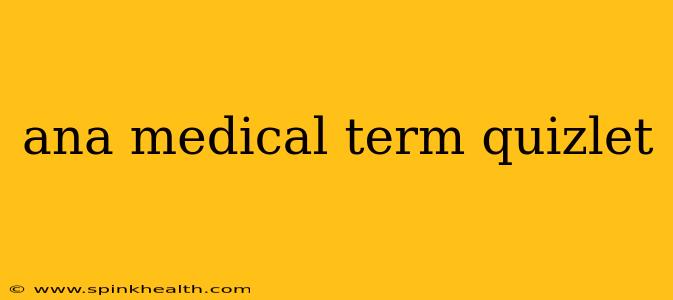Ace Your Anatomy & Physiology Exam: A Journey Through the Human Body with Quizlet
Let's be honest, anatomy and physiology can be a beast. Memorizing all those muscles, bones, organs, and their intricate functions feels like scaling Mount Everest... without oxygen. But what if I told you there's a Sherpa to guide you? That's where Quizlet steps in, your trusty companion on this anatomical adventure. This isn't just about acing a quiz; it's about truly understanding the amazing complexity of the human body.
This post will delve into how to effectively use Quizlet for mastering medical terminology, particularly focusing on anatomy and physiology. We'll explore various techniques, address common challenges, and even tackle some frequently asked questions. Get ready to conquer your medical terminology fears!
How Can I Use Quizlet for Anatomy and Physiology?
Quizlet isn't just about rote memorization; it's a versatile tool offering various study modes tailored to different learning styles. Imagine it as a multi-tool for your anatomical toolbox. You can:
-
Create Flashcards: The classic approach. Write the medical term on one side and its definition, pronunciation, and even a related image on the other. This simple act of creation itself helps solidify the information.
-
Learn Mode: Quizlet's algorithm cleverly shuffles your cards, focusing on terms you struggle with. It's like having a personal tutor constantly challenging you.
-
Write Mode: Test your recall by writing the definitions from memory. This is excellent for solidifying the information and identifying knowledge gaps.
-
Test Mode: Put your knowledge to the ultimate test with various quiz types – multiple-choice, matching, and even true/false – to simulate the exam environment.
-
Scatter Mode: A fun, interactive game that helps you learn terms through visual association and speed.
-
Use Pre-made Sets: Don't reinvent the wheel! Search for anatomy and physiology sets created by other students or educators. This saves time and offers a variety of perspectives.
What are the Best Quizlet Features for Medical Terminology?
Quizlet offers several features specifically useful for medical terminology:
-
Images and Diagrams: Adding visuals makes learning more engaging and helps you connect terms to their physical location or function. For example, include a diagram of the heart when studying cardiac terminology.
-
Audio Pronunciation: Mastering pronunciation is crucial in medicine. Quizlet allows you to record or use text-to-speech for accurate pronunciation practice.
-
Tags and Folders: Organize your sets efficiently. Create tags like "Musculoskeletal System," "Cardiovascular System," etc., for easy navigation and focused study sessions.
-
Collaboration: Share sets with classmates for collaborative learning and peer review.
How Effective is Quizlet for Learning Medical Terminology?
Quizlet's effectiveness depends on your approach. It's a powerful tool, but it's not a magic bullet. Consistent effort and active recall are key. Don't just passively flip through cards; engage actively with the material. Use the different study modes, test yourself regularly, and revise frequently.
What are Some Tips for Using Quizlet Effectively for Medical Terms?
-
Spaced Repetition: Review your flashcards at increasing intervals to strengthen long-term retention.
-
Active Recall: Force yourself to retrieve information from memory rather than passively reading.
-
Mnemonics: Create memory aids to help you remember complex terms.
-
Regular Review: Consistent review is crucial for lasting retention. Schedule regular study sessions, even if they're short.
-
Combine with Other Learning Methods: Quizlet is best used in conjunction with textbooks, lectures, and other learning resources.
Are There Any Alternatives to Quizlet for Medical Terminology?
Yes, several other apps and websites offer similar functionalities:
-
Anki: A powerful flashcard app known for its spaced repetition system.
-
Memrise: An engaging platform that uses mnemonics and gamification to enhance learning.
-
Chegg: Offers study resources and practice questions for a wide range of subjects, including medical terminology.
Ultimately, the best platform depends on your individual learning style and preferences. Experiment to find what works best for you.
This journey through the world of anatomy and physiology using Quizlet is just the beginning. Remember, consistent effort, active engagement, and a strategic approach are your keys to success. Now go forth, conquer those medical terms, and become a master of the human body!

